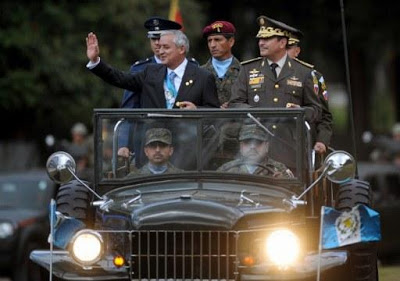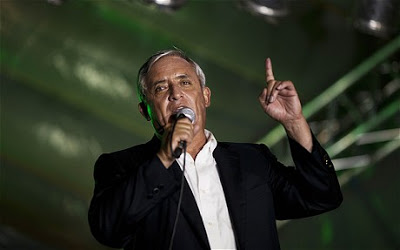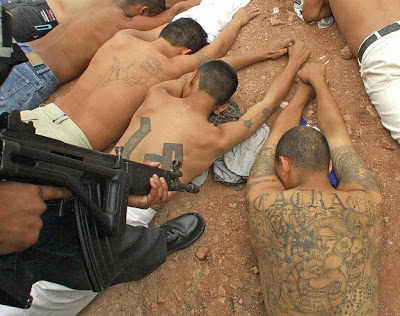Otto Perez Molina and the Drug War
Perez Molina surprised everyone by announcing that he was going to propose to his fellow Latin American leaders the complete legalization of drugs throughout Central America, Mexico, and Colombia.
By David P. Hamilton / The Rag Blog / March 1, 2012
GUATEMALA CITY — On January 14, 2012, Otto Perez Molina was inaugurated as the new president of Guatemala. This justly inspired an outcry of anguish among leftists everywhere.
Perez Molina has a seriously marred resume. He is an ex-Guatemalan army general who specialized in intelligence and who was present in the Quiche Department during the massacres of the Ixil-speaking Maya. Survivors have identified him as having personally tortured them. He served in the notoriously brutal special forces known as the Kaibles as their director of intelligence. He is a graduate of the Guatemalan National Military Academy and the School of the Americas at Ft. Benning, Georgia.
In 1992, Perez Molina was the Director of Military Intelligence when guerrilla leader Efrain Bámaca Velásquez disappeared. Bámaca’s wife, American lawyer Jennifer Harbury, claims that Perez Molina gave the orders to torture and kill her husband.
There are also allegations that Perez Molina participated in the 1998 murder of Juan José Gerardi, the Roman Catholic bishop of Guatemala and a prominent human rights advocate.
How could such a ghastly individual be elected president of Guatemala, a country whose population is half Maya, in the midst of the leftist ascendancy in Latin America? To understand the answer to that question, one must consider other aspects of Perez Molina that appealed to voters and understand the current political climate of Guatemala.
To his credit, in 1983 Perez Molina participated in the coup that overthrew Efrian Rios Montt, the most egregious of all the Guatemalan military dictators during the civil war. That coup brought to power General Oscar Mejia Victorias. Both Rios Montt and Mejia Vitorias are still alive and both have been charged with genocide by Spanish courts. Rios Montt is currently on trial for the same offense in Guatemalan courts.
There are those in the human rights community who say that the only difference between Rios Montt and Mejia Victorias was that the former was a militant evangelical, whereas the latter was a nominal Catholic; that they followed the same counter-insurgency strategy. Others contend that there was a split in the Guatemalan army between the “dinosaurs” such as Rios Montt who wanted to “dry up the sea” in which the guerrillas swam by killing the Maya or relocating them to concentration camps, and the “constitutionalistas” who recognized the need for a political component in order to end the war.
Despite presiding over the killing of thousands more Maya after taking power, Mejia Victorias got rid of Rios Montt, reduced the level of violence, handed over power to the first elected civilian government in decades (albeit under a military thumb) and set in motion the process that eventually resulted in a peace treaty to end the civil war. As is typical in U.S. politics, at least he was better than the other guy.
This faction fight in the military remains a blood feud 30 years later. When Rios Montt’s protégé, Alfonso Portillo, became president in 2000, Mejia Victorias fled into exile in Spain and Perez Molina resigned from the military. Now Perez Molina shows no sign of interfering with the trial of Rios Montt who is under house arrest and being prosecuted by a militant woman attorney general. Meanwhile, his 81-year old mentor, Mejia Victorias, hangs out with old friends in Antigua’s delightful central park.
While serving as chief of military intelligence in 1993, Perez Molina “was instrumental” in stopping then President Jorge Serrano, who had tried to dissolve the legislature and reappoint a new supreme court so he could rule by fiat. Serrano was quickly forced to flee the country along with his vice-president.
His successor, selected by the Congress from a short list reputedly provided by Bill Clinton, was Ramiro de Leon Carpio, who had previously been Guatemala’s human rights ombudsman and had defended Rigoberta Menchu. Perez Molina became de Leon Carpio’s chief of staff and represented the Guatemalan military in the negotiations that eventually led to the 1996 Peace Accords.
Another facet of Perez Molina is his personal experience as a victim of political violence. In early 2000, he retired from the military in order to found a new political party to challenge the Rios Montt faction that held the presidency and had the largest party in the Congress.
In November of that year, Perez Molina’s son was attacked by gunmen while driving with his wife and infant daughter. Three months later, on the eve of Perez Molina’s announcing his new party’s formation, his daughter was wounded by gunmen on the same day that a woman was gunned down immediately after having left a meeting with Perez’s wife.
During his 2007 campaign for president, several members of Perez’s political party were murdered, including a 33-year-old Maya woman who was one of his principal aides.
Perez Molina’s predecessor as president, Alvaro Colom, had defeated him in 2007. Colom came into office as a moderate leftist, but he was a disappointment, considered weak and suspected of corruption. Because Guatemala’s constitution bars a president from running again, Colom tried to have his wife run instead. It was widely reported that she ran the government already.
In order to advance this ploy, they got a divorce. But the Guatemalan Supreme Court wouldn’t buy it and she wasn’t allowed to run. No other left-leaning candidate was successful in getting into the second round run off.
Perez Molina ran the most expensive campaign in the history of Guatemala. His opponent was Manuel Baldizon, described as a multimillionaire Christian populist and proponent of the death penalty who wants to fight crime by televising executions. Both ran with women as their vice-presidents.
Baldizon is a very rich man from the part of the country where the drug gangs are the strongest. Because the drug cartels are so rich and powerful in Guatemala, it is widely assumed that both candidates in the run-off were supported by drug money.
Perez Molina ran for president pledging a “mano duro” against crime. This term has rather sinister connotations in the context of Guatemala. It can be interpreted as somewhere between firm hand and iron fist. Presidents during the civil war used the same term to describe their approach to the insurgency.
Crime is overwhelmingly the consensus number one issue in Guatemala and everyone wants a government that will somehow reduce it. Guatemala’s largest industry is tourism, which has been severely hurt by the country’s reputation for violence. The U.S. Embassy reports that “Guatemala has one of the highest violent crime rates in Latin America.” Currently Guatemala has the seventh highest homicide rate in the world and the successful prosecution rate is negligible.
The bordering countries of Belize (6th), El Salvador (2nd) and Honduras (1st) are worse. In the first seven months of 2011, approximately 42 murders a week were reported in Guatemala City, a city of 2.5 million. Illegal drug money fuels this violence. Perez Molina won the presidency primarily because he was the only candidate who ran convincingly on this issue.
At the time of Perez Molina’s inauguration, critics were warning of the carnage to come. Indeed, his first move was to employ the army to back up the police. Then, a month into office, he surprised everyone by announcing that he was going to propose to his fellow Latin American leaders the complete legalization of drugs throughout Central America, Mexico, and Colombia.
We’re not talking here about the legalization of an ounce of pot for personal use or some other minimal measure. He’s talking about complete legalization — possession, transportation, production, et al, of all illegal drugs. He has said that the evidence clearly shows that the long-standing effort to repress illegal drug use has failed and that different approaches must be considered — such as employing market forces instead of military forces.
He says he will put this proposal on the agenda at the next meeting of regional leaders. However you might decide to interpret this, it was a very radical move, way outside the boundaries of previous discourse. Suddenly, the terms of debate are entirely different. Is he proposing to reduce crime by the simple procedure of making fewer things illegal?
This move has led to considerable speculation as to his motives, everyone having the idea that he’s actually angling for something else. In the The Atlantic magazine, Natalie Kitroeff, a research associate in the Latin America program of the Council on Foreign Relations, says he’s doing it to pressure the U.S. to lift the embargo on selling arms to Guatemala that has been in place since 1978.
But the logic of her argument is that Perez Molina is very publicly calling into question the whole rationale of the Drug War in order to extort the U.S. to give him more money and arms to fight the Drug War. In other words, its open season for speculation and no one really knows what this guy is up to, but everyone assumes that there is a separate agenda lurking somewhere.
It might be appropriate here to consider the contrast between the neighboring cities of Ciudad Juarez in Mexico and El Paso, Texas, USA. The former has one of the highest homicide rates in the world. The latter, just across the dribble known on its north bank as the Rio Grande, has the lowest murder rate of any American city.
However you might choose to explain this phenomenon, some facts are obvious. The drug cartels exist inside the U.S. in large numbers, but they don’t fight there, clear evidence of an agreement to a truce among them. When was the last time you heard of Mexican cartels shooting it out in the streets of LA, a city with several million Mexicans and Mexican-Americans?
They also don’t fight in Mexico City, which has one-third the murder rate of Washington, DC. The heavy price for the Drug War is being paid in blood that flows almost entirely south of the border along the drug transit lanes — the coasts of Mexico and Central America and the U.S.-Mexico border region.
In addition, the illegal drug industry is corrupting the political processes and judicial systems in the whole region. The resulting mayhem is ruining tourism and besmirching their reputations in general. This becomes very much a national security issue for a country like Guatemala and Perez Molina named his political party the Patriot Party.
On the other side of the border in the U.S., the Drug War remains useful to the power elite by providing an excuse to throw thousands of young, mostly-nonwhite men in prison, but generally folks up there are just gettin’ high and ignoring the carnage down south. The U.S. marijuana laws are in an advanced state of decay, the dam having been broken in numerous localities by the medical marijuana movement, most notably California.
Domestic production and consumption of pot in the U.S. have never been higher and there is no shortage. Principled potheads shun “cartel pot.” Although the U.S. remains the world’s largest consumer of cocaine, that market isn’t growing and the street price continues to decline due to oversupply. The market metrics point to declining profits.
Forces supporting legalization of now illegal drugs are gaining momentum throughout Latin America and beyond. Former presidents Vicente Fox and Ernesto Zedillo of Mexico, Fernando Henrique Cardoso of Brazil, and Cesar Gaviria of Colombia, have signed statements and written articles calling for the legalization or decriminalization of drugs. The current presidents of Mexico and Colombia say they are open to discussing the issue.
A recent report from The Global Commission on Drug Policy, backed by high-profile political figures (including former presidents of Brazil, Mexico, Colombia, and Switzerland, the incumbent Prime Minister of Greece, the former UN Secretary General Kofi Annan, the former U.S. Secretary of State George Shultz, the former European Union High Commissioner Javier Solana, and the British billionaire Richard Branson, among others) argues for a move away from the “zero tolerance” approach.
A conference of Latin American leaders last December in Mexico made “an unambiguous call” to legalize and regulate drugs. That conference was attended by the presidents of Mexico, Guatemala, Honduras, Nicaragua, and Panama, the vice-president of Costa Rica, and the foreign ministers of El Salvador, Belize, and Colombia. Their closing statement was a clear acknowledgement that the war on drugs is fueling much of the violence and chaos in their countries.
Exacerbating their dissatisfaction with the U.S.’s lack of success at reducing consumption, the Obama administration is planning to reduce anti-drug trafficking funds to Latin America next year by 16%, including a 60% reduction in such aid to Guatemala. Latin Americans ask themselves, why should we put up our money to fight the U.S.’s drug war when they won’t pay their share or reduce consumption?
Supporters of legalization talk about the effects of allowing market forces to come into play. If currently illegal drugs were legalized in Latin America, they could be shipped north via normal means. The shippers wouldn’t need expensive private airplanes and submarines when DHL will take it as far as Nuevo Laredo. They also wouldn’t need a private army to protect it all along the way. Legitimate business people would become involved and the cartels would be forced to compete and move their money into other areas as the price for their product dropped and their profit margins shrunk.
As the Rand Corporation predicted relative to the possible legalization of marijuana in California in 2010, the price of the drugs on the street would collapse. Only illegality makes the product expensive. Removing much of the money from the industry is the heaviest blow that can be dealt to the drug lords.
As the history of the prohibition of alcohol in the U.S. might suggest, more and more Latin American leaders are thinking that the only way to reduce the violence that plagues their countries is drug legalization. This puts them on a collision course with the U.S. government, regardless of which party is in power.
If Perez Molina and other Latin American leaders do indeed take money from the cartels, Perez Molina’s recent moves would indicate that at least some cartel owners are willing to sacrifice their current mega-profits for peace and legitimacy. It was recently reported that Zetas were living in campers so that their mobility would impede their arrest. They might prefer a house instead.
In this context, the idea of dumping the whole problem in Washington’s lap has considerable appeal to Latin American leaders located between the sources in the south and the big consumer up north. They could free resources to repress violence instead of bothering about the drugs.
Much of the rationale for the violence disappears and much of the money is taken out of the market when these products are no longer illegal. And the inherent anti-Americanism of legalization might be an issue that unites Latin American leaders across the political spectrum. Indeed, the more conservative leaders are taking the lead on this, although ex-coca grower Evo Morales is doubtless on board.
Now Perez Molina has thrown the fat on the fire in a highly public manner. If he puts it at the top of the agenda of the next meeting of regional leaders in March, expect a major freakout in Washington. The U.S. news media, almost totally fixated on the machinations of a pack of Republican losers and the corrupt U.S. presidential race, has so far ignored these loud knocking sounds on our southern door.
It is not unlikely that the U.S. will soon find itself without allies in the war on drugs and thus be compelled to adopt a wholly new approach.
[Rag Blog contributor David P. Hamilton has been a political activist in Austin since the late 1960s when he worked with SDS and wrote for The Rag, Austin’s underground newspaper. Read more articles by David P. Hamilton on The Rag Blog.]





















This is an important article
Mr. Hamilton’s research and analysis should be picked up by mainstrem press…what happens in Guatemala DOESN’T stay in Guatemala…one world folks, one world
Please correct the spelling of country’s name from Columbia to Colombia.
Thank you.
nice blog